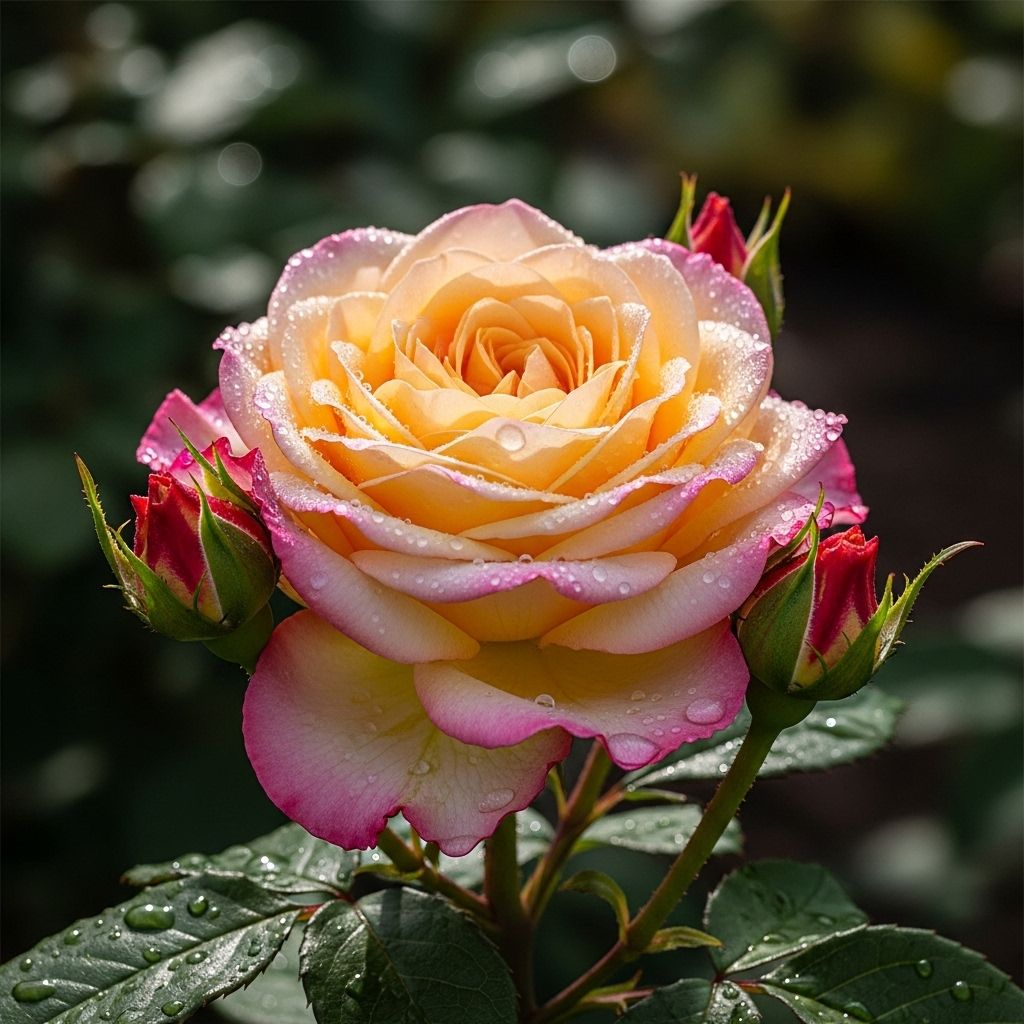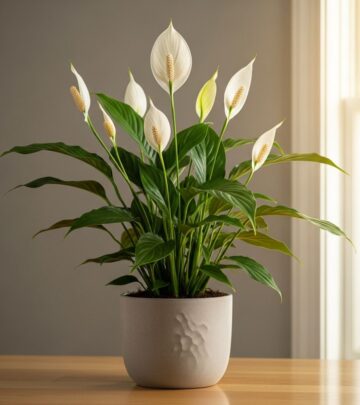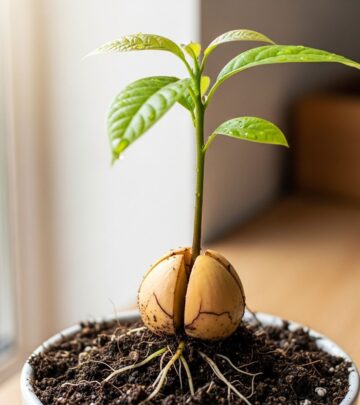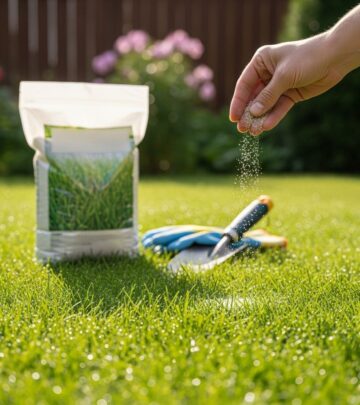Hybrid Tea Roses: The Ultimate Guide To Cultivation And Care
These elegant blooms reward patience with vibrant petals and unforgettable fragrance.

Hybrid Tea Roses: Icons of Grace, Beauty, and Versatility
Hybrid tea roses are celebrated as the queens of the rose world—a symbol of refinement, high style, and enduring garden charm. With their classic shape and captivating fragrance, these roses are a must-have for enthusiasts and florists alike. Renowned for their solitary, voluptuous blooms atop long, elegant stems, hybrid tea roses have maintained their popularity for generations and remain the gold standard in rose gardening whether gracing formal beds or starring in bouquets.
Known for their stunning appearance, vibrant colors, and long, singular stems, hybrid tea roses set the standard for garden and floral beauty.
What Defines a Hybrid Tea Rose?
- Single, large blooms rest at the top of each straight stem, creating a dramatic effect for gardens and cut arrangements.
- The classic ‘teacup’ shape features a high-centered spiral of petals that unfurl perfectly as the flower matures.
- Upright growth habit (typically 3–6 feet tall, 2–3 feet wide), ideal for formal gardens or as standalone specimens.
- Varied color palette: deep reds, vibrant yellows, delicate pinks, whites, oranges, purples, and bi-colored petals.
- Intense, classic rose fragrance in many varieties, though some are less scented.
Key Botanical Facts
- Botanical Name: Rosa spp.
- Hybrid teas belong to the Rosaceae family, which also includes apples, peaches, plums, and pears.
- Flowering Season: Hybrid teas bloom from late spring well into fall in most regions.
Why Grow Hybrid Tea Roses?
- Their stately appearance and symmetrical blooms make them prized centerpieces in landscapes and floral arrangements.
- They are the best roses for cut flowers, offering long vase life (4–16 days) and dramatic form.
- Newer varieties are increasingly disease resistant, lowering maintenance demands.
- Offers exceptional versatility: perfect for formal beds, mixed borders, narrow garden strips, and stylish pots.
Hybrid Tea Roses vs. Other Roses: Quick Comparison
| Feature | Hybrid Tea Rose | Grandiflora | Floribunda |
|---|---|---|---|
| Bloom Type | Single, large bloom per stem | Clusters (2–3 blooms per stem) | Multiple small blooms per cluster |
| Stem Length | Long and straight | Moderately long | Shorter |
| Primary Use | Cut flower, formal garden | Garden display | Mass landscaping |
| Fragrance | Often strong | Moderate | Varies |
| Disease Resistance | Improved in newer varieties | Varies | Often high |
The Most Popular Hybrid Tea Rose Varieties
Hybrid tea roses are available in hundreds of exquisite varieties. Here are some of the most recognized and beloved kinds, each with unique characteristics:
- Peace
- Legendary for its creamy yellow petals edged with pink
- Symbol of hope and calm
- Very robust and widely grown worldwide
- Mr. Lincoln
- Deep red velvet blooms
- Powerfully fragrant
- Tall, upright growth with large flowers
- Double Delight
- Creamy white petals highlighted by deep strawberry-red edges
- Intensely fragrant
- Excellent cut flower
- Queen Elizabeth
- Soft pink blooms with classic form
- Named for royalty
- Disease resistant and reliable
- Blue Moon
- Lavender-blue blooms, rare in roses
- Mild fragrance
- Eye-catching addition to any garden
Color Spectrum: From Bold to Subtle
Hybrid tea roses enchant with their extraordinary color range. Whether you crave the drama of deep reds or the softness of pastels, there’s a hybrid tea rose to match every garden vision.
- Red: Symbolizing passion and love (e.g., Mr. Lincoln)
- Pink: Soft, romantic, and universally appealing (e.g., Queen Elizabeth)
- Yellow: Cheerful and energizing (e.g., Peace)
- White: Pure and timeless (e.g., Pope John Paul II)
- Lavender/Purple: Unique and dramatic (e.g., Blue Moon)
- Orange/Coral: Bright and tropical (e.g., Tropicana)
- Bi-Colored: Eye-catching blends (e.g., Double Delight)
Growth Habits and Garden Uses
- Height: 3–6 feet (0.9–1.8m)
- Spread: 2–3 feet (0.6–0.9m)
- Ideal for formal rose beds, borders along fences, and as garden focal points.
- Stems make them the preferred cut flower for arrangements and bouquets.
Caring for Hybrid Tea Roses
Hybrid tea roses demand some attention, but with proper care, they reward gardeners with spectacular, long-lasting blooms. Here’s how to keep your hybrid teas thriving:
- Sunlight: Full sun (at least 6 hours daily)
- Soil: Well-drained, fertile loam with consistent moisture
- Watering: Deep, infrequent watering to encourage deep root growth
- Fertilizing: Balanced rose fertilizer during the growing season
- Pruning: Annual pruning in late winter or early spring to maintain shape and vigor
- Removing spent blooms: Deadhead regularly for continued flowering
- Disease & pest control: Select newer varieties for better resistance; use preventative fungicides or organic sprays where needed
Planting Zones
- Most hybrid tea roses are suitable for USDA zones 4–10
- Check specific cultivars for optimal performance based on your climate
Conditioning Cut Roses for Maximum Vase Life
- Select stems that are turgid, free of scarring, and have partially closed rose heads.
- Remove any foliage below the water line to prevent rot.
- Use rose gloves to carefully remove thorns before arranging.
- Re-cut stem ends with a sharp knife at an angle for optimal hydration.
- Hydrate in water with commercial floral food for 2 hours before display.
- Proper conditioning extends vase life, helps blooms open completely, and prevents ‘bent neck’ syndrome.
Design Uses: Hybrid Tea Roses in Floristry & Gardens
- Ideal for bouquets, corsages, and wedding arrangements
- Outstanding as standalone displays in formal gardens, entranceways, and along fences
- Mix well with structured designs, but may not blend with densely planted mixed borders
Tips for Purchasing and Planting Hybrid Tea Roses
- Choose healthy bareroot or own-root stock for best results
- Inspect for disease resistance and climate suitability before purchase
- Plant in spring or fall, avoiding periods of extreme heat or frost
- Space plants according to mature size and garden layout
Advancements in Hybrid Tea Rose Breeding
Rose breeders continue to push boundaries, introducing stronger, more disease-resistant, and climate-adapted cultivars. The modern hybrid tea rose can thrive in a wider range of zones, and many are much less prone to common rose diseases than older types.
This progress ensures that hybrid tea roses are not just for experienced gardeners—they’re increasingly accessible for beginners as well!
Frequently Asked Questions (FAQs)
Q: What makes hybrid tea roses ideal for cut arrangements?
A: Their large, symmetrical blooms on extra-long, straight stems offer maximum drama and longevity in bouquets, making them the standard for florists worldwide.
Q: Are hybrid tea roses hard to grow?
A: Modern varieties are bred for improved disease resistance and broader climate adaptability, significantly lowering maintenance compared to older cultivars.
Q: When and how should hybrid tea roses be pruned?
A: Prune in late winter or early spring, removing weak, dead, or crossing stems and shaping while encouraging healthy new growth.
Q: Do all hybrid tea roses have fragrance?
A: Many varieties are intensely fragrant, but some have little or no scent, so always check descriptions before choosing.
Q: How do I choose the right hybrid tea rose for my garden?
A: Consider color preference, fragrance, growth habit, disease resistance, and climate requirements for your region.
Q: What causes ‘bent neck’ in cut roses, and how can I avoid it?
A: Bent neck is usually due to inadequate hydration or failing to condition stems correctly. Re-cut stems under water and use floral food for maximum vase life.
Conclusion: The Timeless Appeal of Hybrid Tea Roses
The hybrid tea rose embodies the most cherished qualities of the rose family: classic beauty, stunning colors, and singular elegance. With ever-improving resilience and magnificent blooms, these roses remain the definitive choice for gardeners, designers, and flower lovers everywhere. Whether you aspire to create a show-stopping rose bed or wish to fill your home with fragrant bouquets, hybrid tea roses promise to deliver beauty season after season.
References
- https://www.gardenia.net/plants/genera/rosa-hybrid-tea-rose
- https://witherspoonrose.com/collections/hybrid-tea-roses
- https://www.floraldesigninstitute.com/blogs/resources-flower-library/rose
- https://www.davidaustinroses.com/collections/hybrid-teas
- https://www.jacksonandperkins.com/hybrid-tea-roses/c/JP-Hybrid-Teas/
Read full bio of medha deb












